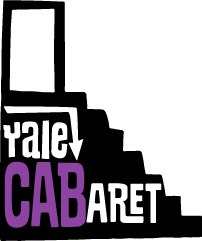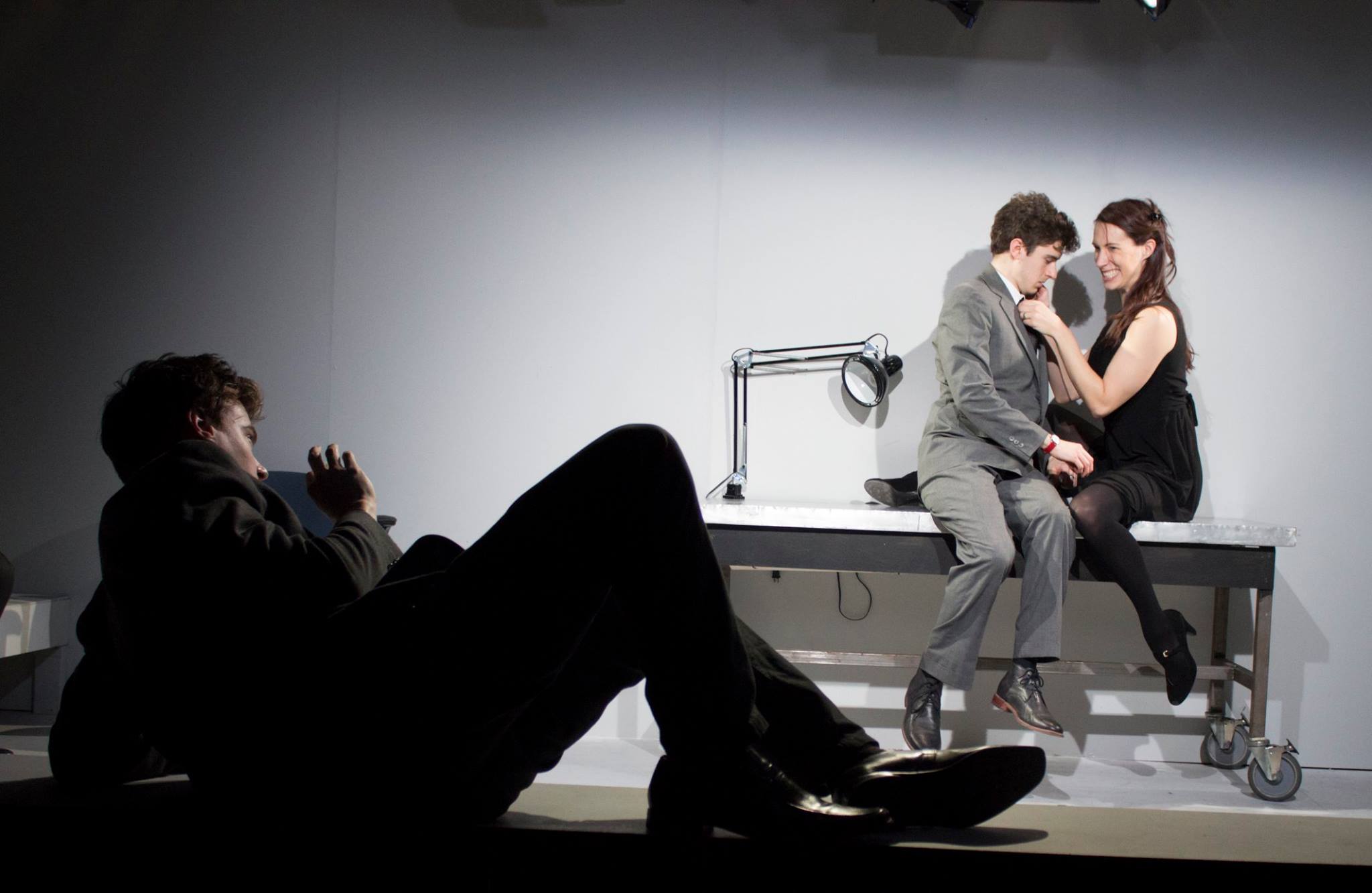 Season 47 of the Yale Cabaret has ended its run as of April 25th, which must mean it's time for a re-cap of the season. A re-cap wherein I try to recall and celebrate my favorite contributions to the magical basement that is the Yale Cabaret. Ready? Here are a baker's dozen of categories with my five exemplars in each (in chronological order, but for my fave pick), for a total of 65 citations:
New Play: This year’s top five never-before-seen, new plays were: Look Up, Speak Nicely, and Don’t Twiddle Your Fingers All the Time, in which Alice in Wonderland—or rather Liddy in Wonderland—meets “Little Miss” beauty pageants, written with verve for a cast of crazies by Emily Zemba; The Zero Scenario, in which every Cleveland in these United States is threatened by the Ticks of Death but for a special plucky band of heroes, written by Ryan Campbell; The Untitled Project, in which a collective of black male YSD’ers create self-portraits in the context of racial profiling, conceived and directed by Ato Blankson-Wood and created by the ensemble; Sister Sandman Please, in which three sisters put it out there for a cowboy, with varying degrees of passion, irony and intention, written by Jessica Rizzo; and ... 50:13, in which an incarcerated black man about to be freed tries to tell it like it is, with candor, wit and a variety of character sketches, to a young prison-mate, written by Jiréh Breon Holder.
Season 47 of the Yale Cabaret has ended its run as of April 25th, which must mean it's time for a re-cap of the season. A re-cap wherein I try to recall and celebrate my favorite contributions to the magical basement that is the Yale Cabaret. Ready? Here are a baker's dozen of categories with my five exemplars in each (in chronological order, but for my fave pick), for a total of 65 citations:
New Play: This year’s top five never-before-seen, new plays were: Look Up, Speak Nicely, and Don’t Twiddle Your Fingers All the Time, in which Alice in Wonderland—or rather Liddy in Wonderland—meets “Little Miss” beauty pageants, written with verve for a cast of crazies by Emily Zemba; The Zero Scenario, in which every Cleveland in these United States is threatened by the Ticks of Death but for a special plucky band of heroes, written by Ryan Campbell; The Untitled Project, in which a collective of black male YSD’ers create self-portraits in the context of racial profiling, conceived and directed by Ato Blankson-Wood and created by the ensemble; Sister Sandman Please, in which three sisters put it out there for a cowboy, with varying degrees of passion, irony and intention, written by Jessica Rizzo; and ... 50:13, in which an incarcerated black man about to be freed tries to tell it like it is, with candor, wit and a variety of character sketches, to a young prison-mate, written by Jiréh Breon Holder.
Adapted Play: Impressive pre-existing plays adapted for Cab 47 included four translations and an English-language opera: Don’t Be Too Surprised, written by Geun-Hyung Park, translated and directed by Kee-Yoon Nahm, lets us know in no uncertain terms that familial dysfunction can still take surprising forms on stage; MuZeum, translated and directed by Ankur Sharma, tells stories from ancient sources and contemporary headlines, to dramatize powerfully the victimization of women; Quartet by Heinrich Müller, translated by Doug Langworthy, directed by David Bruin, revisits Laclos’ Dangerous Liaisons as a wickedly entertaining pas de deux and psychologically fraught cat-and-mouse; The Medium, an opera by Gian Carlo Menotti, directed by Ahn Lê, creates a world of mystery, loss, and deep feeling and gives further credence to the notion that opera is not just for opera houses; and ... Leonce and Lena by Georg Büchner, translated by Gavin Whitehead, directed by Gavin Whitehead and Elizabeth Dinkova, presents a play of aristocratic ennui that torches the well-made play, and this time with puppets!
Set Design: After all, the Cab is a basement with a kitchen, and convincing us we’re in a new space each week takes some doing. Here are some set designs that went beyond all expectation in their achieved artistry: Kurtis Boetcher’s set for Look Up, Speak Nicely, and Don’t Twiddle Your Fingers All the Time made a door where there’s a window and had the coloring and style of a child’s playhouse; Joey Moro’s versatile set for Hotel Nepenthe breathed a seedy charm, like we imagine Hotel Duncan does, or should; Chika Shimuzi and Izmir Ickbal’s stunning set for MuZeum lent aura aplenty and eye-catching beauty to its revue-style presentation; Christopher Thompson’s set for The Zero Scenario seemed to defy space itself in cramming so much busy-ness into the Cab, including a motelroom and a hidden headquarters, and ... Adrian Martinez Frausto’s moody set for The Medium was so fully achieved in its seedy gentility it might be a film set inviting a camera’s scrutiny.
Costumes: Dressing actors for their parts often goes beyond the norm, creating inspired additions to the visual flair of a show. Some of the tops in costumes were: Grier Coleman’s range of captivating dress for ancient characters of India and contemporary folks in MuZeum; Fabian Aguilar and Alexae Visel’s super cool get-ups for the agents protecting us from Tick Apocalypse in The Zero Scenario; Alexae Visel’s authentic mock-ups of the cartoonish costumes of the old Batman series “fit just like my glove” in Episode 21: Catfight; Haydee Zelideth had a field day with modernist Enlightenment-era costuming in Leonce and Lena; and ... Soule Golden and Montana Blanco rendered camp versions of the White Rabbit, Hatter, White Queen, and Tweedledum/dee we won’t soon forget in Look Up, Speak Nicely, and Don’t Twiddle Your Fingers All the Time.
Lighting: It doesn’t just help us see, it also selects and shows and evokes, sometimes making for quite magical effects. Illuminating dancers with lights that added to both movement and music in Solo Bach: Caitlin Smith Rapoport; creating a wealth of visual effects that kept us entranced in MuZeum: Joey Moro; putting on a show and putting-on the trappings of a storybook world in Look Up, Speak Nicely, and Don’t Twiddle Your Fingers All the Time: Joey Moro; using light to complement stories and to add drama in 50:13: Elizabeth Mak; and ... creating an Old World atmosphere both spooky and authentic in The Medium: Andrew Griffin.
Sound: It can be used in striking or surprising ways, or to create an aural texture to accompany the action. Creating a wintery world with bursts of music and broadcasts in Rose and the Rime: Jon Roberts, Joel Abbott; maintaining a sustained eerieness and B-movie aura in Hotel Nepenthe: Sinan Zafar; incorporating music and a range of emotional tones in MuZeum: Tyler Kieffer; bringing together recorded voice, spoken voice, and background music into a collage in The Untitled Project: Tyler Kieffer; and ... merging voices, sound effects, loops and his own music to create a shifting aural space in Sister Sandman Please: Chris Ross-Ewart.
Music and Movement: We don’t always get both, but it can make for entrancing theater when we do: MuZeum featured essential music by Anita Shastri, played on stage by a crew of musicians/actors and interacted with by the actors; The Untitled Project used recorded music tellingly and featured a show-stopping dance sequence by Ato Blankson-Wood; The Medium presented a stirring reduction of Menotti’s score into a solo piano tour de force by Jill Brunelle, expressive miming from José Ramón Sabín Lestayo, and impressive vocals from the cast; Sister Sandman Please benefited from Chris Ross-Ewart’s compositions amidst the aural textures, and delighted with a raucous “O Holy Night” from Ashley Chang; and ... Solo Bach showcased Zou Yu’s amazing solo violin performances, combined with the inventive, cryptic and dramatic choreography by Shayna Keller and her actor/dancers: Paul Cooper, Chalia La Tour, Julian Elijah Martinez, Leora Morris.
Special Effects: An ad hoc category that includes whatever doesn’t fit into other categories, such as: the combination of lights and star chart backdrop to create a sense of wonder in Touch: Joey Moro; the evocative projections-as-scenery in Solo Bach: Rasean Davonte Johnson; the B-movie monster ticks and blood and projections and other effects in The Zero Scenario: Rasean Davonte Johnson, Mike Paddock; the varied creepy puppets, hand-held and string-operated, in Leonce and Lena: Emily Baldasarra; and ... the use of projections and clips to tell stories and create context with images in The Untitled Project: Rasean Davonte Johnson.
Acting (ensemble): Ideally, the acting in a play is a group affair, in which everyone plays a part, of course. Still, it’s worth remarking on when a cast is more than the sum of its parts, as in these shows: Look Up, Speak Nicely and Don’t Twiddle Your Fingers All the Time, the big kick-off extravaganza of the season featured a gallery of colorful characters by Sarah Williams, Celeste Arias, Aubie Merrylees, Shaunette Renée Wilson, Yahya Abdul-Mateen II, Melanie Field, Andrej Visky, Libby Peterson; The Zero Scenario, the crowd-pleasing first semester closer, pulled out all the stops with Ariana Venturi, Tom Pecinka, Sara Holdren, Ankur Sharma, Aaron Profumo, Emily Zemba, Ryan Campbell; The Untitled Project, an ensemble-derived show that focused on the subtle distinctions and broad stereotypes of race, was created and enacted by Taylor Barfield, Ato Blankson-Wood, Cornelius Davidson, Leland Fowler, Jiréh Breon Holder, Phillip Howze, Galen Kane; Leonce and Lena, in which actors and puppet-handler/actors interacted to create a zany theatrical world of kingdoms and encounters, with Sebastian Arboleda, Juliana Canfield, David Clauson, Anna Crivelli, Ricardo Dávila, Edmund Donovan, Josh Goulding, Steven C. Koernig, Lynda A.H. Paul, Nahuel Telleria; and ... Hotel Nepenthe, a comic tour de force of changing roles, repeating characters, and linked situations that ran from the creepy to the farcical, all created with manic intensity by Bradley James Tejeda, Annelise Lawson, Emily Reeder, Galen Kane.
Acting (individual): For individual performances, I’m going with some standouts, whether in accomplished ensemble work, or showcased in two-handers, or in the unrelenting spotlight of the solo show. Ladies first: Celeste Arias, hilarious as an unhinged mommie dearest in Look Up, Speak Nicely and Don’t Twiddle Your Fingers All the Time; Sydney Lemmon, riveting as Mme Merteuil but even more so as Mme Merteuil/Valmont in Quartet; Maura Hooper, chameleonic as a series of characters, including a disaffected nun and a happy hooker, in Shiny Objects; Zenzi Williams, demonstrating a range of attitudes in four characters, from spiritual to demur to quietly confident in Shiny Objects, and ... Tiffany Mack, unforgettable as a heart-wrenching victim of an acid attack in MuZeum.
Acting (individual): And from the men: Jonathan Majors, finding himself in an unbearable situation and quietly going to pieces in Touch; Tom Pecinka as a highly verbal passenger monologuing his anxiety in The Zero Scenario; Edmund Donovan, riveting as Valmont but even more so as Valmont/Mme de Tourvel in Quartet; Ricardo Dávila as the slippery, caustic and fascinating Valerio in Leonce and Lena; and ... Leland Fowler as a stand-up guy feeling the longings of the jailed and acting out a quick lesson in family history and racism in 50:13.
Directing: For the vision behind the whole shebang that makes it all hang together, we celebrate directors: for the all-out campy and creepy charm of Look Up, Speak Nicely, and Don’t Twiddle Your Fingers All the Time: Ato Blankson-Wood; for keeping the hopscotch logic and many shifts in tone of Hotel Nepenthe on point: Rachel Carpman; for creating the interplay of stories, including humor, confrontation, and violence in MuZeum: Ankur Sharma; for showing a dramatic and thoughtful grasp of the resilience of a human spirit trapped in a cage in 50:13: Jonathan Majors; and ... for providing the comic highpoint of the season with wild charm, horror surprises and relentless verve in The Zero Scenario: Sara Holdren.
Production: From the above, it’s obvious which shows seemed tops to me, but to bring them all together for a final nod: Hotel Nepenthe, Sarah Williams, producer, Taylor Barfield, dramaturg, Avery Trunko, stage manager, the kind of shifting and surprising show that keeps me coming back to theater; MuZeum, Anita Shastri, producer, Maria Ines Marques, dramaturg, Emily DeNardo, stage manager, a strong and cathartic import to our shores; The Zero Scenario, Ahn Lê, producer, Helen Jaksch and Nahuel Telleria, dramaturgs, Anita Shastri, stage manager, a crazy sci-fi ride that screams “sequel!”; 50:13, Jason Najjoum, producer, Taylor Barfield, dramaturg, Lauren E. Banks, stage manager, an important and meaningful addition to the one-person play and the "black lives matter" movement; and ... Look Up, Speak Nicely, and Don’t Twiddle Your Fingers All the Time, Kelly Kerwin, producer, Nahuel Telleria, dramaturg, Avery Trunko stage manager, “the gang’s all here” type of theater, presenting a lively riff on the rigors of growing up female in our media-ized Wonderland.
Thanks again to our hosts for 18 weekends—plus a Drag Show: Molly Hennighausen, Will Rucker, Tyler Kieffer, and Hugh Farrell. And ... see you next season, at the Cab!
The Yale Cabaret
Season 47
September 18, 2014-April 25, 2015



















